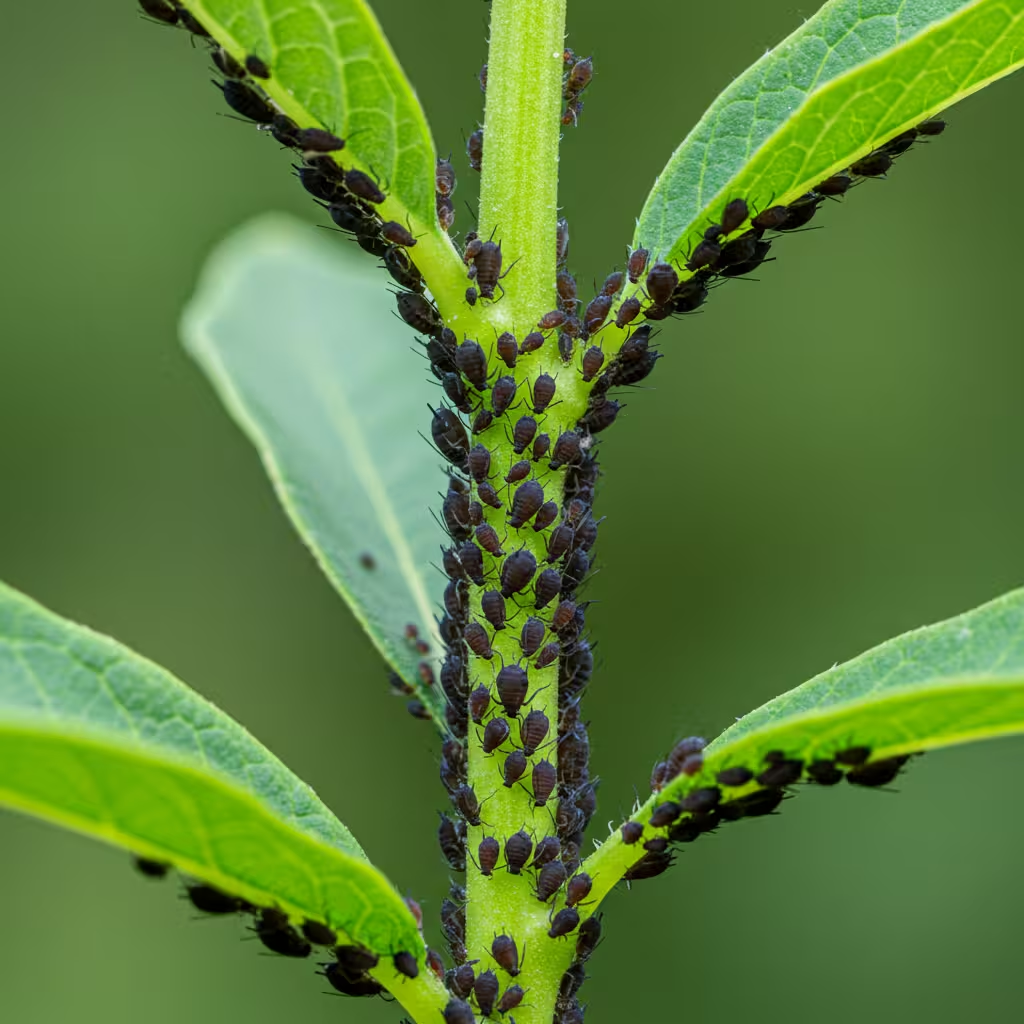Discover how to protect your precious plants from aphid invasions using simple, eco-friendly ingredients that work better than commercial pesticides.
Understanding the Aphid Menace: Why These Tiny Pests Cause Big Problems
If you’ve ever ventured out to your garden only to discover your beloved roses, tomatoes, or fruit trees covered in clusters of tiny insects, you’ve encountered one of gardening’s most persistent foes: aphids. These small but mighty pests can wreak havoc on your garden ecosystem seemingly overnight.
Aphids are soft-bodied insects that feed on the sap of plants, causing a range of problems that can devastate your carefully tended garden:
- They extract vital nutrients from plants, leading to stunted growth and deformed leaves
- The sticky “honeydew” they excrete attracts ants and promotes the growth of sooty mold
- They can transmit plant viruses and diseases between plants
- Their rapid reproduction rate means a few can become thousands in just days
Many gardeners, in their desperation to save their plants, turn to commercial chemical pesticides. However, this approach often creates more problems than it solves.
The Hidden Dangers of Chemical Aphid Control
Commercial pesticides might seem like a quick fix, but they come with significant downsides that affect more than just the aphids:
Environmental Impact
Chemical pesticides don’t discriminate between harmful and beneficial insects. When you spray them, you’re not just killing aphids—you’re potentially harming:
- Ladybugs, lacewings, and other natural aphid predators
- Essential pollinators like bees and butterflies
- Soil microorganisms that contribute to plant health
Health Concerns
The residues from these products can:
- Contaminate edible crops, requiring thorough washing or waiting periods
- Pose risks to children and pets who play in treated areas
- Cause skin irritation or respiratory issues during application
Long-Term Effectiveness
Perhaps most frustrating is that chemical treatments often lose effectiveness over time:
- Aphids can develop resistance to synthetic pesticides
- By killing natural predators, you may actually increase aphid populations long-term
- Many products require frequent reapplication, increasing cost and exposure
Fortunately, nature provides everything we need to combat these garden invaders effectively without resorting to harsh chemicals.
Nature’s Aphid Assassin: The Ultimate Homemade Solution
What if you could create a powerful aphid treatment using just a few simple ingredients from your kitchen? This natural remedy harnesses the properties of common household items to create a solution that aphids absolutely cannot tolerate.
The Power Ingredients
This remarkable spray combines four simple elements:
1. Garlic
More than just a culinary staple, garlic contains sulfur compounds that act as natural insect repellents. The strong odor and taste are particularly offensive to soft-bodied pests like aphids while being harmless to plants.
2. Wood Ash or Baking Soda
These alkaline substances create an inhospitable environment on leaf surfaces. Aphids prefer slightly acidic conditions, so this simple addition disrupts their comfort zone and discourages feeding and reproduction.
3. Natural Soap
The secret weapon in this formula is ordinary soap. It breaks down the waxy protective coating on aphids’ bodies, causing them to dehydrate. Unlike harsh detergents, natural soap works without damaging plant tissues.
4. Water
The universal solvent brings everything together, creating a sprayable solution that can reach every nook and cranny where aphids might hide.
The Recipe: Your Step-by-Step Guide
Creating this powerful aphid repellent is remarkably simple:
You’ll Need:
- 5 large cloves of fresh garlic
- 2 tablespoons of wood ash (from untreated wood) or baking soda
- 1 teaspoon of mild liquid dish soap or finely grated natural soap
- 1 liter (1 quart) of hot water
- A spray bottle
- Cheesecloth or fine strainer
Preparation Method:
- Prepare the Garlic Infusion
- Peel and crush the garlic cloves thoroughly
- Place them in a container with hot (not boiling) water
- Allow to steep for at least one hour (for maximum potency, let it sit overnight)
- Create the Base Solution
- Add the wood ash or baking soda to the garlic water
- Stir thoroughly until well incorporated
- Finish the Mixture
- Just before you’re ready to use the spray, add the soap
- Stir gently to avoid creating too many bubbles
- Strain and Bottle
- Pour the mixture through cheesecloth or a fine strainer to remove solid particles
- Transfer to a clean spray bottle
- Label clearly so you don’t confuse it with other garden sprays
Application Strategy: Timing and Technique Matter
How you apply your natural aphid spray significantly impacts its effectiveness. Follow these guidelines for optimal results:
Optimal Timing
- Early Morning or Late Evening: Apply when temperatures are cooler and the sun isn’t directly shining on plants. This prevents potential leaf burn from the combination of spray and sunlight.
- After Rain: Reapply after heavy rain as the solution will have washed away.
- Preventative Schedule: For ongoing protection, apply weekly during the growing season, even if you don’t see aphids yet.
Thorough Coverage
- Undersides of Leaves: Pay special attention to the undersides of leaves where aphids commonly hide and feed.
- New Growth: Young, tender shoots are particularly attractive to aphids, so ensure these areas receive good coverage.
- Stem Junctions: The areas where stems meet are common aphid gathering spots.
Strategic Frequency
- Initial Infestation: Apply every 3 days until aphid populations are noticeably reduced.
- Maintenance: Once under control, weekly applications should keep problems at bay.
- Seasonal Attention: Be particularly vigilant during spring and early summer when aphid populations typically explode.
Beyond Spraying: Creating a Comprehensive Aphid Defense
While this natural spray forms the cornerstone of your aphid control strategy, combining it with other natural approaches creates a truly robust defense system:
Garden Design for Pest Management
Companion Planting:
Certain plants naturally repel aphids and can protect vulnerable species:
- Strongly scented herbs like mint, catnip, and chives
- Marigolds, nasturtiums, and petunias
- Garlic and onions planted throughout the garden
Attracting Beneficial Insects:
Create habitat for aphid predators by planting:
- Dill, fennel, and other umbelliferous plants for lacewings and parasitic wasps
- Sunflowers, zinnias, and cosmos for ladybugs
- Shallow water sources for various beneficial insects
Cultural Practices
Regular Monitoring:
Inspect plants frequently, paying special attention to new growth and the undersides of leaves. Early detection allows for more effective intervention.
Proper Plant Spacing:
Crowded plants create ideal conditions for aphids to spread. Proper spacing improves air circulation and makes it harder for infestations to move between plants.
Optimal Watering:
Strong, healthy plants withstand aphid pressure better than stressed ones. Water deeply but infrequently to encourage strong root development.
Advanced Troubleshooting
Dealing with Ant Protectors:
Ants “farm” aphids for their honeydew and will protect them from predators. Create barriers around plant stems using:
- Diatomaceous earth
- Cinnamon powder
- Coffee grounds
- Chalk lines
Stubborn Infestations:
For particularly persistent problems:
- Prune heavily affected areas and dispose of them away from your garden
- Use a strong stream of water to physically knock aphids off plants before applying the spray
- Apply the garlic solution as a soil drench around plant bases to target eggs and hidden aphids
Seasonal Strategies: Year-Round Aphid Prevention
Different seasons call for different approaches to aphid management:
Spring
- Monitor plants daily as new growth emerges
- Apply preventative sprays before aphids appear
- Release purchased ladybugs at dusk after watering your garden
Summer
- Continue regular application of the natural spray, especially during humid periods
- Remove any plants that are severely compromised and acting as aphid reservoirs
- Maintain adequate plant hydration to reduce stress
Fall
- Clean up garden debris where aphids might overwinter
- Apply the garlic solution as a soil drench to eliminate eggs
- Consider floating row covers for vulnerable fall crops
Winter
- Plan your spring garden layout with companion planting in mind
- Start garlic to have a fresh supply for next year’s spray
- If you have a greenhouse, maintain vigilance as indoor plants can harbor aphids year-round
Beyond Aphids: Other Garden Uses for Your Natural Spray
This powerful solution isn’t just for aphids—it’s effective against various soft-bodied garden pests:
- Spider Mites: These tiny relatives of spiders also succumb to the soap component
- Whiteflies: Another sap-sucking pest that affects similar plants
- Thrips: Small insects that damage flowers and leaves
- Mealybugs: White, cottony pests often found on houseplants and in greenhouses
Additionally, the spray has mild fungicidal properties thanks to the alkaline ash or baking soda, helping to prevent powdery mildew and other fungal issues.
Frequently Asked Questions About Natural Aphid Control
Q: Is this spray safe for all plants?
A: While most plants tolerate it well, always test on a few leaves first. Plants with very delicate foliage may be sensitive to the soap component.
Q: How long does the mixed spray stay effective?
A: For best results, use within 1-2 weeks. Store in a cool, dark place and shake well before each use.
Q: Can I use this spray on edible plants?
A: Yes, but rinse produce thoroughly before consuming. Apply the spray several days before harvest for best results.
Q: What if I don’t have wood ash?
A: Baking soda works perfectly as an alternative. Other options include food-grade diatomaceous earth or powdered cinnamon.
Q: Can I use this spray indoors on houseplants?
A: Yes, but be aware that the garlic creates a temporary odor. Apply in the morning so the smell dissipates by evening.
Conclusion: A Garden Free From Aphids, Naturally
Ridding your garden of aphids doesn’t require harsh chemicals or expensive commercial products. With just a few simple ingredients and consistent application, you can create an environment where these destructive pests simply cannot thrive.
This natural approach offers benefits that extend far beyond aphid control:
- A healthier ecosystem with thriving beneficial insects
- Safe produce free from chemical residues
- A reduced environmental footprint
- Money saved on commercial products
By working with nature rather than against it, you create a sustainable solution that improves your garden’s overall health and resilience. The next time you spot those tiny invaders on your precious plants, reach for your garlic spray bottle with confidence—your garden will thank you.

